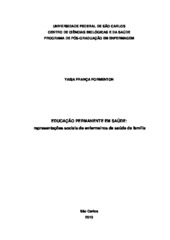| dc.contributor.author | Formenton, Yaisa França | |
| dc.date.accessioned | 2016-06-02T19:48:21Z | |
| dc.date.available | 2013-03-27 | |
| dc.date.available | 2016-06-02T19:48:21Z | |
| dc.date.issued | 2013-02-07 | |
| dc.identifier.citation | FORMENTON, Yaisa França. Educação permanente em saúde : representações sociais de enfermeiros da saúde da família. 2013. 125 f. Dissertação (Mestrado em Ciências da Saúde) - Universidade Federal de São Carlos, São Carlos, 2013. | por |
| dc.identifier.uri | https://repositorio.ufscar.br/handle/ufscar/3254 | |
| dc.description.abstract | One of the main challenges faced by Family Health Strategy to change the model of care is the lack of professionals trained to this role in SUS. The Permanent Health Education is a tool that can lead to qualification in health care and a new logic in the process of health work. In this context, the educational role of nurses is strengthened, and the identification Social Representations education that permeate their educational practices aiming changes or stays in health care become relevant. To Understand the Social Representation of Continuing Education of Health Family nurses; analyze how their educational action influence in work processes and identify strengths and weaknesses in the actions of these Nurses. Qualitative research through semi-structured interviews with nurses from the Family Health of small towns in the Heart Region of DRIII Araraquara - SP. After interviews transcription, the contents were analyzed by comparing the thematic category and lexical analysis by software ALCESTE by using the Permanent Health Education references, Work Process and Social Representations. Four categories were made: 1) Influence of Permanent Education in the work process where fragmentation and professional specialty remains the focus of educational activities; 2) The Centralization of nurses in the actions of Continuing Education in where this role have been seen in two ways, one group recognizes that this their role and others consider that it should be shared with the team; Different conceptions of Continuing Education where the education to update knowledge is hegemonic, showing some movements leading to a conception of education to change the work process, and 4) Difficulties in perfoming educational activities characterized by low motivation of the time and lack of time to carry out the activities. The Social Representation Continuing Education for this group is based in the notion of traditional education, although although it is possible identify some movements that approximate the logic of Permanent Health Education, which may lead to a transformation of the representation. | eng |
| dc.description.sponsorship | Financiadora de Estudos e Projetos | |
| dc.format | application/pdf | por |
| dc.language | por | por |
| dc.publisher | Universidade Federal de São Carlos | por |
| dc.rights | Acesso Aberto | por |
| dc.subject | Enfermagem | por |
| dc.subject | Enfermagem em saúde pública | por |
| dc.subject | Atenção primária à saúde | por |
| dc.subject | Prática profissional | por |
| dc.subject | Educação Profissional em Saúde Pública | por |
| dc.subject | Education Public Health Professional | eng |
| dc.subject | Nursing | eng |
| dc.subject | Primary Health Care, Professional Practice | eng |
| dc.title | Educação permanente em saúde : representações sociais de enfermeiros da saúde da família | por |
| dc.type | Dissertação | por |
| dc.contributor.advisor1 | Ogata, Márcia Niituma | |
| dc.contributor.advisor1Lattes | http://lattes.cnpq.br/3274294833403570 | por |
| dc.description.resumo | Um dos principais desafios enfrentados pela Estratégia Saúde da Família para mudança do modelo de atenção é a falta de profissionais com formação adequada para atuar no SUS. A Educação Permanente em Saúde (EPS) se constitui uma ferramenta que pode levar à qualificação da atenção à saúde e à uma nova lógica no processo de trabalho em saúde. Neste contexto, a dimensão educativa do enfermeiro é reforçada, sendo relevante a identificação das Representações Sociais (RS) de educação que permeiam suas práticas educativas enquanto disparadoras de transformações ou permanências no cuidado à saúde. Objetivos: compreender as RS de Educação Permanente dos enfermeiros da Saúde da Família; analisar como suas ações educativas influenciam nos processos de trabalho e identificar potencialidades e fragilidades nas ações destes enfermeiros. A pesquisa qualitativa que realizou entrevistas semi-estruturadas com 24 enfermeiros da Saúde da Família dos municípios de pequeno porte da Região Coração da DRS III Araraquara SP. Após transcrição, os conteúdos foram analisados através da comparação das análises categorial temática e lexical pelo software ALCESTE, à luz dos referenciais da EPS, Processo de Trabalho e RS. Constituíram-se quatro categorias: 1) Influência da Educação Permanente no processo de trabalho em que a fragmentação e a especialidade profissional continuam sendo o foco das ações educativas; 2) Centralidade do enfermeiro nas ações de Educação Permanente em que esta função é vista de duas formas, um grupo reconhece que este é seu papel e outro que ela deveria ser compartilhada com a equipe; 3) Diferentes concepções de Educação Permanente em que a concepção de educação para atualização de conhecimentos é hegemônica, aparecendo alguns movimentos em direção à uma concepção de educação para mudança do processo de trabalho; e 4) Dificuldades na realização das ações educativas caracterizadas pela baixa de motivação da equipe e na falta de tempo para a realização das atividades. A RS de Educação Permanente para este grupo está ancorada na noção da educação tradicional, embora se identifique movimentos que se aproximam da lógica da EPS, que poderá levar a uma transformação da representação. | por |
| dc.publisher.country | BR | por |
| dc.publisher.initials | UFSCar | por |
| dc.publisher.program | Programa de Pós-Graduação em Enfermagem - PPGEnf | por |
| dc.subject.cnpq | CIENCIAS DA SAUDE::ENFERMAGEM | por |
